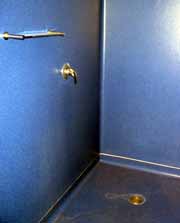Types of Showers
Showers can be a proprietary made item or built to your specifications.
They can hold one or more people and come in a number of different finishes. You as the designer have to be aware of these finishes and water features as well as the problems of water splashing around.
If the shower is not a proprietary system that allows for the sealing of all surfaces you must make sure that the detailing of the shower walls and floor allows no water into the substrate and that any moisture that may creep through cannot do any damage if it does.
It is a very good idea to ensure that all timber framing around and under the shower is treated for external use e.g. H3 or similar.
I would also recommend that the area in behind the shower walls is well-ventilated, as well as the shower or room that the shower is in.
The greatest enemy that a building has is water.

A vinyl clad shower, non slip vinyl to the floor.

A proprietary formed shower with soap trays and footrests, and safety glass sides.
Now the other fundamental point to make before we get into the detail of finishes is that in wet areas with soap it is easy to slip and cause damage to the user.
Be aware that the shower floor should have a surface with a grip and the interior has something that can be held on to.
Although this isn’t law, it is good design practice to incorporate or at the very least ensure that the end user has had the choice of added safety.

A stainless steel shower base, glass door and prefinished water repellant wall panels.
The Shower Floor
Shower floors are predominantly made of either a tiled system, a proprietary plastic or acrylic system, porcelain on steel, vitreous china or stainless steel.
Other metals such as copper or brass may be used however this is not common. Plastic shower bases and to some extent vitreous china bases often have raised integral slip resistant surfaces. Those made with sanitaryware grade acrylic resist chipping won’t rust and have excellent heat retention.
The Walls and Door
The walls of the shower are often made of the same material as the base i.e. acrylic, tiles or glass (all glass to showers has to be the safety type) and often for the effects that can be gained plastic laminates.
The doors to the showers may be clear acrylic, a simple shower curtain or a very common type nowadays is glass.
Every glass door for obvious reasons has to be made of safety glass.
Shower Size
The sizes of showers for single person use are usually 760 x 900 mm or 900 x 900 mm. You will note that they are the same size as a door opening.
There are also corner showers as space savers and larger proprietary systems that can accommodate more than one person.
Other features of showers may include multiple spray heads, footrests, soap and bottle holders and easy clean drains.
Shower Selection
When choosing the type of shower, look for ease of cleaning as well.
Tiles eventually will have the grout between become stained and no end of cleaning will fix it. The grout between tiles can eventually crack due to movement and or temperature fluctuations and although this may take some time to eventuate the problem is likely to occur.
Single sheets of acrylic or moulded shower surrounds in one piece don’t have this problem however they certainly don’t have the design versatility of tiles.
You need to be aware of these factors for the maintenance versus aesthetic value.
